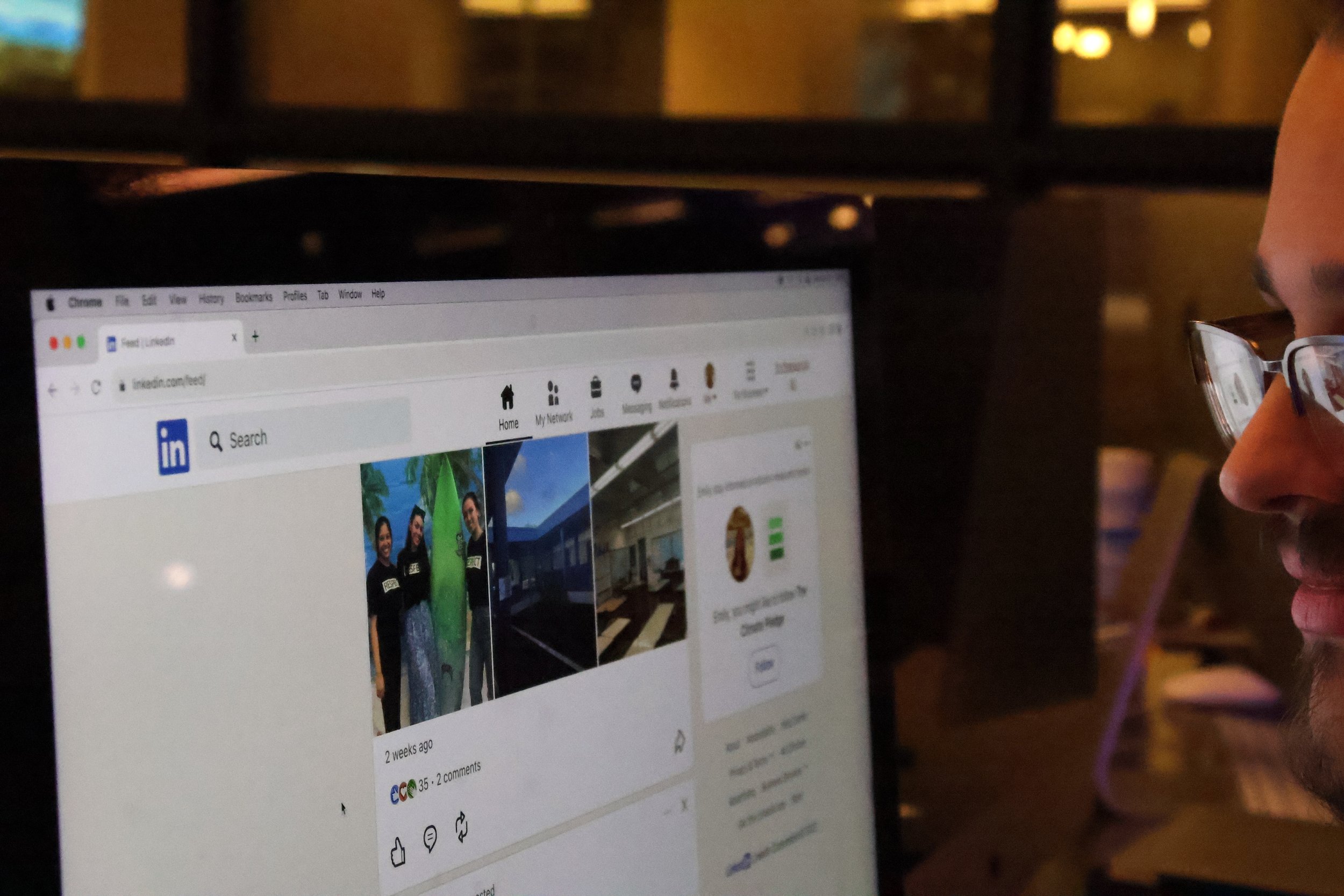LinkedIn: The Next Social Media Craze?
Jackson Lustberg, ‘24, posed scrolling through LinkedIn. By Emily Stellakis ‘24.
With a new generation taking over 21 years after its creation, LinkedIn may become the next Facebook.
The online platform, which first came out in the year 2002, was created as one of the first digital business-oriented social networks for building connections. User profiles consist of a resume, education, job history, list of professional connections and more.
However, the rules appear to be changing now that Generation Z is entering the workforce. After examining post content, several publications have begun to question whether users of the app have become too comfortable with what they are sharing online, blurring the lines between professionalism and socialization.
This comfortability with openness is an attribute largely associated with Generation Z.
Post-pandemic transparency on social media has encouraged the sharing of non-work-related information on various platforms. In a recent Business Insider article, entrepreneur Catalina Valentino attributes this to the youngest users.
“Oversharing comes pretty much down to Gen Z, to be honest with you,” said Valentino, referencing a recent LinkedIn post she made about wearing a "swanky new pair of Louboutins" on her walk to a World Economic Forum post-car breakdown.
Another story from Canadian Business makes an even more explicit statement, saying that in recent years, the platform “has morphed into a Facebook-esque platform where users share personal posts on everything from details of their divorce, baby announcements, thoughts on their favorite sports team and political events, often with the goal of increasing engagement or going viral.”
LinkedIn etiquette is also shifting from what it once was. Use of LinkedIn’s direct messaging tool to form non-professional relationships has become more common than ever before.
And despite the app’s intention to be a space for sharing workplace accomplishments, many of today’s users have been known to shy away from shedding light on their feats more frequently than previous generations. One practice in particular that has received heightened popularity is the “humblebrag” — a term referring to the practice of making a self-deprecating statement with the true intention of drawing attention to an accomplishment while hoping to avoid appearing cocky.
“I think people ‘humblebrag’ because they're anxious or insecure or both,” said Liana Folmsbee ‘25. “They want to make themselves look good, but they also don't want to seem arrogant to whoever they're talking to.”
To members of the Marist College community, this noticeable shift in LinkedIn is one to pay attention to, as students sense danger in overlapping the worlds of business and social interaction. Getting too personal could threaten Gen Z’s development as professionals.
“Honestly, I think that if people want to be more transparent on LinkedIn, it could backfire on them,” said Elody Burko ‘25. “There’s probably employers out there that don’t like that, which could rule things out for you.”
“LinkedIn is supposed to be a professional environment, and by turning it into a place to socialize, it undermines the point and takes away from using it for its intended purpose,” said Raven Stanet ‘25.
However, not all are opposed to the change. Other Red Foxes feel the transition is an accurate and positive reflection of an increasingly transparent Gen Z, which they feel can help bring people closer together online.
“I think a little personalization can be a good thing,” said Lauren Palmadesso ‘25. “People are going to post what they want to post; if a little oversharing brings people together, that could make for positive change.”
Jeffrey Basinger, Marist assistant professor of journalism and multimedia storytelling, feels relatively impartial on the debate, believing that LinkedIn has always been a social media platform and that adjustments in its usage are only inevitable.
“I don’t think these changes are a good thing or a bad thing. Whatever direction LinkedIn goes in terms of its social media-esque quality, every social media platform evolves,” said Basinger.
With a workplace culture bound to differ from previous generations, it appears undeniable that LinkedIn is not the same as it was. What this change entails, however, will be determined by the next generation of employers and employees.
